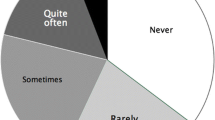Abstract
This paper explores the relationship between men and food. Building on James E. Dittes’s work, it suggests that men’s desire for food is indicative not only of their hunger, but also of an unquenchable sense of hope and a longing for significant relationships. Based on the insights of several biblical scholars and pastoral theologians, this paper also suggests that a greater understanding of how and why men eat can contribute to a more pertinent pastoral ministry with men.
Similar content being viewed by others
Notes
The relationship between men and food has not been sufficiently explored in pastoral theology. Within the wider field of religious studies, however, there seems to be an increasing interest in food studies. The American Academy of Religion, for example, has recently included several program units on food: a seminar entitled Religion, Food, and Eating in North America (2008–2012), a Religion and Food Group (2014), and a group that explores the intersection between religion, food, and migration (2014).
Biblical citations in this paper come from the New Revised Standard Version (NRSV).
Neel and Pugh (2012) suggest that Jesus and his disciples ate tilapia that morning (pp. 217–218). See also their “Menu for a Picnic on the Beach” (p. 222).
References
American Academy of Religion. (2014). Program units. http://www.aarweb.org. Accessed 17 Jan 2014.
Bird, B., & Pinkava, J. (Directors). (2007). Ratatouille [Motion picture]. United States: Pixar Animation Studios.
Bordo, S. (1994). Reading the male body. In L. Goldstein (Ed.), The male body: Features, destinies, exposures (pp. 265–306). Ann Arbor: University of Michigan Press.
Capps, D. (2000). Deadly sins and saving virtues. Eugene: Wipf and Stock Publishers.
Capps, D. (2001). Agents of hope: A pastoral psychology. Eugene: Wipf and Stock Publishers.
Cornier, M., Salzberg, A. K., Endly, D. C., Bessesen, D. H., & Tregellas, J. R. (2010). Sex-based differences in the behavioral and neuronal responses to food. Physiology & Behavior, 99, 538–543. doi:10.1016/j.physbeh.2010.01.008.
Crossan, J. D. (1991). The historical Jesus: The life of a Mediterranean Jewish peasant. San Francisco: HarperSanFrancisco.
Dittes, J. E. (1985). The male predicament: On being a man today. San Francisco: Harper & Row.
Dittes, J. E. (1996). Driven by hope: Men and meaning. Louisville: Westminster John Knox Press.
Doehring, C. (2006). The practice of pastoral care: A postmodern approach. Louisville: Westminster John Knox Press.
Duneier, M. (1992). Slim’s table: Race, respectability, and masculinity. Chicago: University of Chicago Press.
Dykstra, R. C. (2001). Discovering a sermon: Personal pastoral preaching. St Louis: Chalice Press.
Dykstra, R. C. (2009). Subversive friendship. Pastoral Psychology, 58, 579–601.
Erikson, E. H. (1968). Identity, youth, and crisis. New York: Norton.
Finger, R. H. (2007). Of widows and meals: Communal meals in the book of acts. Grand Rapids: William B. Eerdmans Publishing Co.
Gregersen, N. T., Moller, B. K., Raben, A., Kristensen, S. T., Holm, L., Flint, A., & Astrup, A. (2011). Determinants of appetite ratings: the role of age, gender, BMI, physical activity, smoking habits, and diet/weight concern. Food & Nutrition Research, 55, 1–10. doi:10.3402/fnr.v55i0.7028.
Hamilton, V. P. (1990). The book of genesis: Chapters 18–50. Grand Rapids: William B. Eerdmans Publishing Co.
Isherwood, L. (2007). The fat Jesus: Feminist explorations in boundaries and transgressions. London: Darton, Longman and Todd.
Jacobs-Molina, D. (1993). Beyond patriarchy: The images of family in Jesus. Mahwah: Paulist Press.
Milton, J. (2011). Paradise lost. (Biblically annotated ed. by M. Stallard). Macon: Mercer University Press.
Neel, D. I., & Pugh, J. A. (2012). The food and feasts of Jesus: Inside the world of first-century fare with menus and recipes. Lanham: Rowman & Littlefield Publishers.
Osherson, S. (1986). Finding our fathers: How a man’s life is shaped by his relationship with his father. New York: Fawcett Columbine.
Pérez Álvarez, E. (2002). We be jammin: Liberating discourses from the land of the seven flags. Mexico City: El Faro.
Perrin, N. (1967). Rediscovering the teaching of Jesus. London: SCM Press.
Skinner, J. (1956). A critical and exegetical commentary on Genesis (2nd ed.). Edinburgh: T & T Clark.
Speiser, E. A. (1964). Genesis: Introduction, translation, and notes. Garden City: Doubleday and Company.
Young-Eisendrath, P. (1999). Women and desire: Beyond wanting to be wanted. London: Piatkus.
Acknowledgments
I would like to thank Donald Capps and Robert Dykstra for their ongoing support and for introducing me to the work of James Dittes. I also want to thank Mexican theologian Eliseo Pérez Álvarez, who first introduced me to Jesus’ radical commensality. Finally, I want to thank my mother, Guadalupe Mejía Herrera, who has been not only my primary nourisher but my teacher in learning to savor life.
Author information
Authors and Affiliations
Corresponding author
Rights and permissions
About this article
Cite this article
Arjona-Mejia, R. Hoagies and Tacos: Food and Men’s Unquenchable Hunger. Pastoral Psychol 64, 297–310 (2015). https://doi.org/10.1007/s11089-014-0605-5
Published:
Issue Date:
DOI: https://doi.org/10.1007/s11089-014-0605-5




